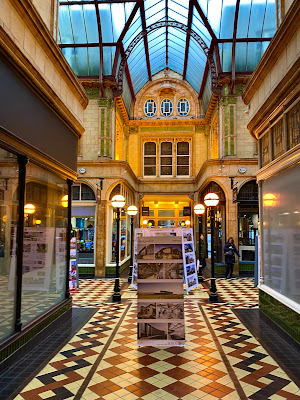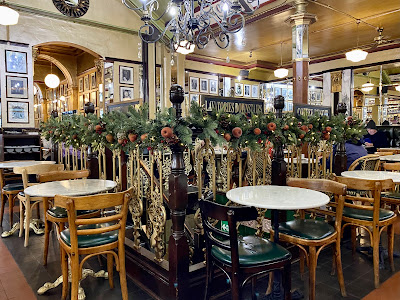 |
| Preston Bus Station |
 |
| Cenotaph, Town Hall, Harris Library and Museum |
The bus wriggled its way through the partly pedestrianised city centre to the massive 80-stance Preston Bus Station. I had worked on the construction of this as a student. I had mixed the concrete for the curved concrete ends on the 4-story car park above the bus station, I was pleased to see that they were still pristine after 52 years of wet Lancashire days. My father had campaigned for the bus station's retention when the Council proposed its demolition twenty years ago. Admittedly half the stances had been closed because there has been a retraction of bus transport over the past fifty years as car ownership has soared.
I was impressed by the way the bus station had retained its grandeur, it was considered a fine example of brutal architecture when erected in 1970 and is now a listed building. It is certainly far more robust than the speculative shopping developments that sprang up at the time. The adjacent St John's Centre is a prime example of this artless era of development. I headed for the splendid covered market that I had visited most Fridays with my mother for the weekly shop. Its wrought iron structure and roof are vintage examples of a functional and robust structure. A glassed-in enclosure within the market detracts from the simple elegance and the majority of stalls now sell cheap tat with fewer stalls selling fresh local produce at affordable prices.
I was taking a photo when an Indian gentleman approached me and passed some comments on the market. We struck up a conversation and established an easy rapport. We discovered that his younger brother had attended the same school as my sister and was at school with a friend. He used to come with us to the local pub on Friday evenings. The coincidence of this casual meeting was remarkable and ten minutes later I was passed the phone of the Indian gent to talk to his younger brother. I had not seen him for 55 years but we reminisced about our teenage exploits, he now lives in Somerset. I gave the phone back and bade farewell to his brother and concluded it was one of those days when I was on a roll. I decided to drop in at the Council Offices to see if I could talk to someone about progress on community wealth building.
Arriving at the Council offices I was met by a Council Officer who suggested I should see the Chief Executive but he was in a special Council meeting to discuss the Israeli - Gaza conflict. He suggested that I could go and listen to the debate. I accepted because I wanted to see for myself how the Council operated and was guided to the public gallery. The motion from the administration called for a ceasefire, well-meaning but I guess that the soft power of Preston City Council is no more effective than that of the UK government. I listened to 7 speakers, all articulate, focused and well-informed. One speaker had lived in Gaza and spoke about the conditions his relatives and friends were living in, another was a Doctor at the local hospital and spoke with more humanity and sincerity than any MP I have heard in Parliament. The motion was unanimously carried with the Conservative spokesperson saying he agreed with the sentiments of those who had spoken eloquently with such knowledge. As I left I was given the Chief Executive's email in case I had time to arrange a meeting in the next few days.
I continued my walk about in the city centre, admiring the fine Victorian and Edwardian buildings - the former post office, the cenotaph, the Town Hall and the Harris Museum and Library that provided some gravitas and solidity. Miller Arcade, which used to be at the centre of all the bus stances, had retained its elegance. The Gaumont and later the Odeon which had been the epicentre of all activity was a boarded-up shell. It was the analogue version of Tinder when I was growing up and hundreds if not thousands of marriages must have begun here.
I was pleasantly surprised that Fishergate, the main shopping street, was in good health despite the loss of Owen Owens, BHS, Booths, Woolworths and Mears toy shop. M&S was busy and well-stocked and the St George's Shopping Centre had few vacant units and good footfall. Only buses were allowed along Fishergate and there was a lively stream of pedestrians.
I veered off Fishergate to visit Winckley Square, the location of solicitors and professional offices and the Catholic Convent for girls. I had peddled through here regularly as a 9 to 12-year-old during my train spotting days at the nearby station which was on the London, Midland and Scottish mainline and gave a spectacular display of steam locomotives. As well as the Stanier Pacifics on the London to Glasgow Royal Scot Express, we had fish trains from Fleetwood, holiday specials to Blackpool from Yorkshire and Jubilee and Britannia locomotives pulling the Birmingham and Manchester to Scotland expresses.
I calmed down by calling in at Bruccianis, a glorious art-deco Italian cafe, where my mother and Grandma used to meet for a coffee and I acquired my fondness for toasted teacakes. As I turned into Corporation Street I passed the barber shop that I went to as a boy. It was empty so I popped in to have a look, it had hardly changed apart from the hair products on display. Brylcream was the only option in the 1960s. The Turkish barber who now runs the shop was keen to hear about the history of the shop and his predecessor.
Time was running out so I ran to catch a bus and was back at my sister's house by 1 p.m. The impression from a morning of unashamed nostalgia was that Preston had suffered from the decline of the city centre and that some solid buildings needed refurbishing and possibly repurposing. The civic centre around the Museum and Library, Winckley Square and the adjacent Avenham and Miller parks were real attributes and the city-owned bus service was excellent. There had been too many retail developments in outlying areas that led to much traffic congestion and a turn-off for residents who would have flocked to the city centre in the past. Central Lancs University had created a vast swathe of Education buildings but it had regenerated a part of the city that was long past its best. On balance, Preston was better than I had been led to believe but still needed to be revamped and rid of its unlovely buildings. Most of all, I was impressed by the debate in the Council.
In the evening we visited Haighton Manor, a fine restaurant and pub a couple of miles outside the city, for a good value meal with an excellent selection of local beers. Getting there was no longer a drive in the country but a burst through suburbia. The amount of development surrounding the City has been massive with mainly large private housing estates that are off bus routes, have no local facilities and require a car to get anywhere. The outcome is inevitable as in so many towns and cities, congestion and anger at the authorities.
The lack of attention or willingness by the housing developers to provide facilities or sustainable well-designed houses is one of the great mistakes of the last forty years. They have built too many houses that barely meet minimum standards and fail to achieve anything like the zero carbon standard. This should be essential as we move into the post-climate change era.
Unlike many of the solid brick-built terraced houses that orbit the city centre, or the early post-war semi-detached houses and council houses that have been upgraded, a fair proportion of the newer mass-produced houses of recent decades are not robust enough for retrofitting. Houses developed since the 1970s with flimsy materials will all too often have to be replaced to create more sustainable communities. Land use strategies that are currently focused on converting city centre buildings, and redeveloping brownfield sites need to be extended to include the legacy of shoddy developments that have been allowed to encroach on peripheral greenfield sites. Most of all we need to design and repurpose our towns and cities to a scale that energises communities by focusing on pedestrians and cyclists rather than worshipping the car that has strangled the fabric of integrated communities.
 |
| Covered Market |
 |
| Council Meeting |
 |
| Miller Arcade |
 |
| Gaumont Cinema and Dance Hall |
 |
| Winckley Square |
 |
| Bruccianis Coffee Shop |

No comments:
Post a Comment
thanks